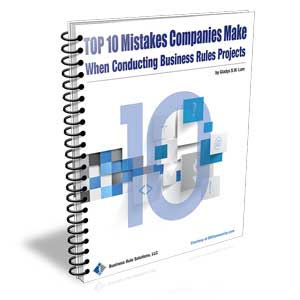Can You Violate Structural Rules? (Part 3) ~ The Difference Between Breaking Rules and 'Breaking' Knowledge
| This issue's column is another installment of my periodic 'notepad' series, which focuses on specific issues facing practitioners seeking to understand business rules and make them part of their company's approach to requirements and system development. |
This three-part series examines the fundamental differences between structural rules (which include both inference and computation rules) and operative rules. In this final part, these distinctions are revisited and summarized.
Structural business rules enable the business to create (i.e., to structure) its own private world of encoded knowledge. They give shape (i.e., structure) to core notions of the business by precisely establishing clear lines of demarcation for each. Via inferences and computation rules, they also allow the business to extrapolate its knowledge in a highly-organized (structured) fashion. Here are examples of basic structural rules from previous parts of this series:
Structural Rule: A Customer must be considered Gold Customer if the Customer places more than 12 orders in a calendar year.
Structural Rule: A Customer may be considered a Gold Customer only if the Customer was incorporated more than a year ago.
During business activity, structural business rules are used to evaluate 'where you are' (current state) as the need arises. For example, is this customer a gold customer or not? Do we owe this customer a discount on this order? Does this patient have cat scratch fever or something else? The conclusion reached in each case is only as good as the logic within the rules. Poor or misapplied logic yields poor or inconsistent results. In that case, some aspect of the encoded knowledge 'breaks down' -- it simply does not work properly.
Operative business rules enable the business to run (i.e., operate) its activities in a manner deems suitable, optimal, and/or best aligned with its goals. Operative rules deliberately preclude specific possibilities (of operation) that are deemed undesirable or less effective. Breaking an operative rule will not 'break' the knowledge, but the threat of sanction is often quite real. Break an operative rule and a clear-cut violation occurs.
In one way or another, operative business rules are always preventative. Surgical gloves must be worn in performing surgery. (This rule is intended to prevent infections.) A nurse must visit a patient at least every 2 hours. (This rule is intended to prevent inattention to patients.) A gold customer must be allowed access to the warehouse. (The rule is intended to prevent any prevention of access.)
Which then is more basic, structural rules or operative rules? Both are obviously essential, but structural rules are the more basic because they establish what the business can possibly know (in encoded form). No operative rule can be violated unless the knowledge on which it is based can be known in the first place. Operative rules obligate or prohibit behavior that otherwise would be possible according to the structural rules alone. In other words, structural rules create degrees of freedom (possibilities), and operative rules take them away.
Why create degrees of freedom only then to take them away? In a word, adaptability. You never know what the future holds. Operative rules represent today's best practices; structural rules provide tomorrow's possibilities.
# # #
About our Contributor:
Online Interactive Training Series
In response to a great many requests, Business Rule Solutions now offers at-a-distance learning options. No travel, no backlogs, no hassles. Same great instructors, but with schedules, content and pricing designed to meet the special needs of busy professionals.










How to Define Business Terms in Plain English: A Primer
How to Use DecisionSpeak™ and Question Charts (Q-Charts™)
Decision Tables - A Primer: How to Use TableSpeak™
Tabulation of Lists in RuleSpeak®: A Primer - Using "The Following" Clause
Business Agility Manifesto
Business Rules Manifesto
Business Motivation Model
Decision Vocabulary
[Download]
[Download]
Semantics of Business Vocabulary and Business Rules